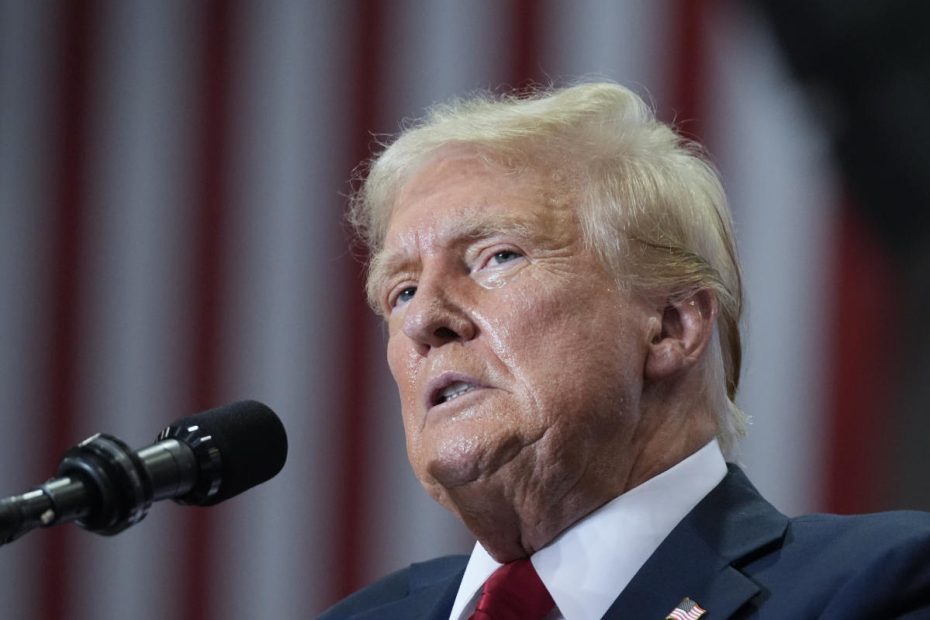NEW YORK (AP) — Donald Trump appeared to backtrack on Monday on his earlier commitment to debate Vice President Kamala Harris, questioning the value of a meeting and saying he “probably” will debate but “could make an argument for not doing so.”
Trump was pressed several times in an interview with Fox News Channel on Monday night to decide whether to debate Harris, but ultimately gave a weaker response than he had in recent days.
The former Republican president was eager to debate President Joe Biden when he was the Democratic nominee, after suggesting for months that Biden was not mentally ready for the matchup — or the presidency. But after Biden withdrew from the race and Harris emerged as the Democratic presidential nominee, Trump has cast doubt on the terms of the original debate he agreed to with Biden. He has suggested that the Sept. 10 debate on ABC News be moved to another network, calling ABC “fake news.”
Last week, Trump was asked in a phone call with reporters if he would commit to debating Harris at least once. He responded, “Oh yeah, absolutely. I would,” and said there was an obligation to debate.
In Monday's interview, presenter Laura Ingraham repeatedly asked Trump if he was willing to debate.
“I want to have a debate. But I can also say this. Everybody knows who I am. And now people know who she is,” Trump said.
Trump eventually said, “The answer is yes, I will probably get into a debate.”
He went on for a minute, saying that all debates should be held before early voting begins in the states, then added, “The answer is yes, but I can also make an argument for not doing it.”
Trump has skipped debates before, including all of the 2024 Republican presidential primary debates. He initially did not participate after suggesting the timing was too early, then questioning the location of another debate, before ultimately making it clear he would not participate in any of them.
The Republican candidate also sought clarification in Monday's interview about comments he made last week at a conservative event in which he told a Christian audience that they “don't have to vote anymore” after he is elected.
He urged Christians, who he claims do not vote en masse, to vote “just this once,” saying, “You don't have to do that anymore.”
In four years, he said, “It will be resolved, it will be good. You don't have to vote anymore, my beautiful Christians,” he said.
He added a moment later: “In four years, you won't have to vote anymore. We're going to arrange it so well that you won't have to vote anymore.”
The comments sparked widespread concern among Democrats and others who noted Trump's habit of using authoritarian language, his previous comments that he would not be a dictator until “day one” and his behavior after losing the 2020 presidential election, in which he refused to accept the results and sought to overturn them.
His campaign team and supporters offered varying explanations for Trump's comments, and Ingraham pressed him to explain what he meant.
“They don't vote, and I tell them that. 'You never vote.' Vote this time. I'm going to straighten out the country. You don't have to vote anymore. I don't need your vote anymore,” Trump said.
Ingraham asked if he meant that Christians shouldn't vote for him because he will only be in office for four years.
Trump began his answer by talking about the voting percentages of Christians and gun owners. Ingraham interrupted him to question him again.
“Don't worry about the future. Vote, go, you have to vote on November 5th. After that, you don't have to worry about voting anymore. I don't care because we're going to fix it, the country is going to be fixed up and we don't even need your vote anymore because frankly, we're going to have so much love. If you don't want to vote anymore, that's OK,” Trump said.
Trump made similar comments at another Christian event last month, expressing his dismay over Christian voting rates and urging them to participate in the election.
“In four years, you don't have to vote, okay? In four years, don't vote. I don't care,” he said.
___
Adriana Gomez Licón, an Associated Press editor in West Palm Beach, Florida, contributed to this report.

